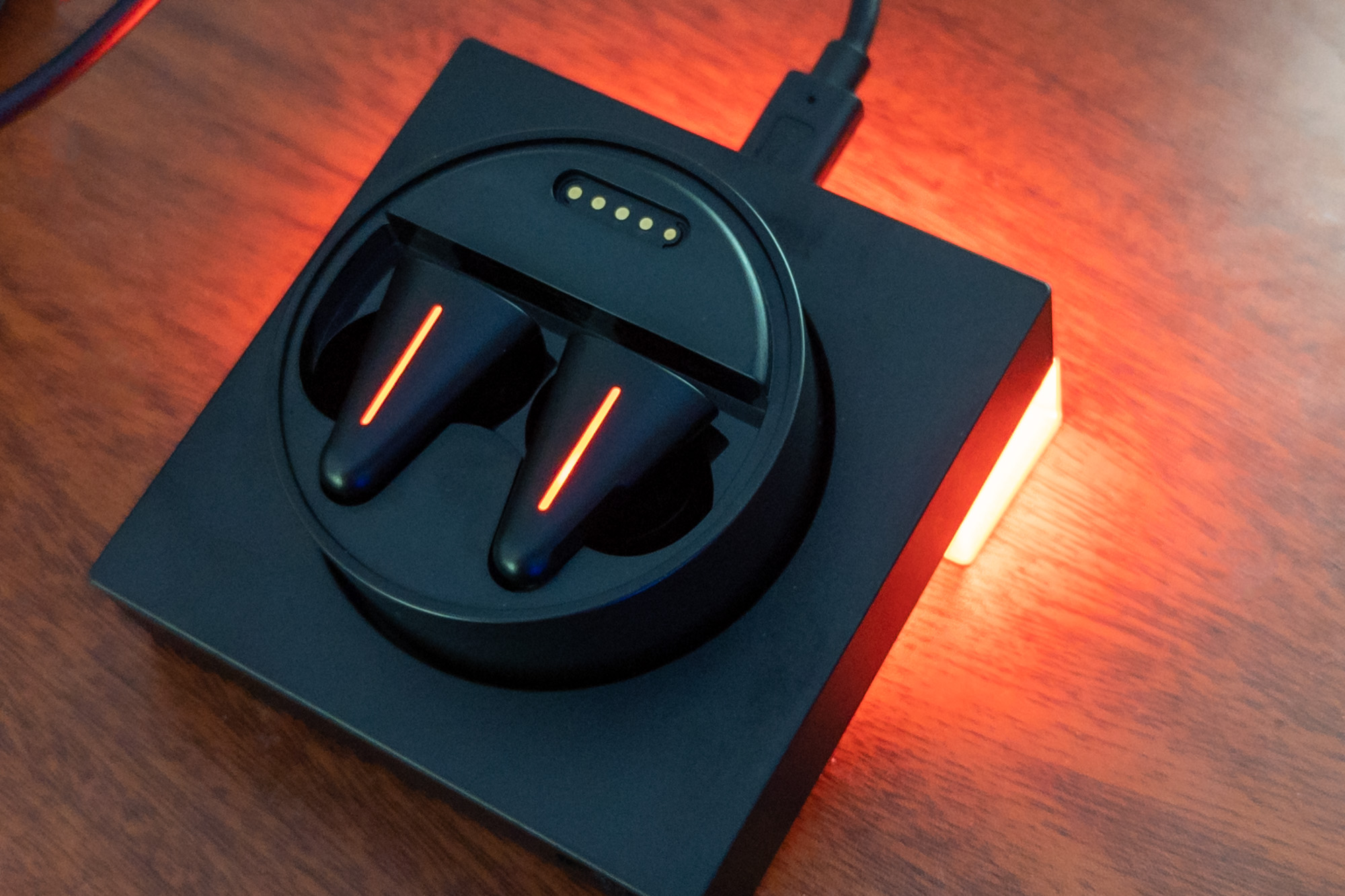We review a lot of headphones and earbuds here at TechCrunch, and most of them compete for the low- or mid-range of the earbud market. With price points ranging from $75 through $300 or so, they’re often awfully same-ish. The feature set is not dissimilar. They sound different, yes, but not by so much that you’d feel like your life would be ruined if you’d picked one set over the other. It’s a rare moment, then, that I get a piece of equipment shipped to me that breaks the mold. That’s precisely what happened with Angry Miao‘s Cyberblade headphones. The base station (yes, there’s a base station) feels like it was carved out of steel and glass. The whole setup weighs in at a whopping 370 grams — that’s 13 ounces. It’s also rare that a company refuses to tell me what their price point is.
Like much of Angry Miao’s line, this is a product that appears to be aimed at gamers — from the multicolor LED feast for your eyes, to the ludicrously fancy base station, to the carrying case for the device, which includes a rotating volume knob that controls the volume on your computer or phone. There was a whole lot of “What the ever-loving heavens is going on here?” in the unboxing and setup process of these earbuds. They cram a stupid amount of tech into it all, as well — and it’s a refreshing take on the “What if we didn’t have to make earphones that are as small and light as possible?” paradigm.
[gallery ids="2364010,2364011,2364012"]
The company shared with me why it is making earbuds at all. They point out that wireless earbuds have been around for a hot minute but that they are plagued with lag. As such, they’re not great for gaming, and the company claims you can do a lot with the audio-processing chips that already exist in earbuds.
Angry Miao decided to flip things on its head. It created a base station that includes an audio processing chip. Because it’s designed to be plugged into the computer, it matters a lot less how power-hungry the chip is, which in turn unlocks a lot of additional computing power in the charging base. In fact, when you pair the earbuds to your phone, you don’t actually pair the earbuds themselves; you pair the charger case. That means that the earbuds can be controlled from the case using a private audio stream protocol. It also unlocks a bunch of additional audio processing possibilities. The company maintains that this unlocks the next generation of high-definition audio with all the bells and whistles without sacrificing battery life on the earbuds.
When the earbuds are plugged into a computer, and with its Active Sound Enhancement (ASE) enabled, the company claims it gives users superfast ultra-low latency audio at approximately 40 ms delay (compared to AirPods Pro’s supposed 200 ms delay, according to Angry Miao). The company claims that this means it can deliver high-quality audio with low latency, as opposed to other low-latency products that sacrifice audio quality for speed. In addition, the company offers the usual battery of active noise cancellation and audio-source-dependent sound optimizations — for Zoom meetings, for gaming, for music, for movies, you name it.
[gallery ids="2364014,2364013,2364015,2364016,2364017,2364018"]
Is it fantastically cool? Absolutely. Do the earbuds have notably better audio quality than my Sony LinkBuds S earphones? Not really. Was I able to notice the difference in latency of the sound when I was playing games? Not really, but then, I’m not exactly a pro gamer.
I spoke to the company’s CEO, Li Nan, in a pretty chaotic interview, but he assures me that lag is a terrible problem for everyone, including people who are not gamers, without really being able to explain why.
“Old apps like a movie player, have higher latency and use a software trick to fix the latency problem. But in the future, the hardware must step forward,” says Nan. “Our product is fast enough that we do not need any additional work at software level. We all have very good latency. That will make it much harder for other brands.”
I challenge Nan on why 200 milliseconds — a fifth of a second — was a big deal when I’m watching Netflix. Yes, there’s a software adjustment, potentially, to make the audio sync up with the video, but…so what?
No clear answer was forthcoming, and it still isn’t entirely clear to me why these earphones need to exist, nor what their price is — the company resolutely refused to tell me, other than that “they are slightly more expensive than Apple AirPods Pro,” before Nan asked me if I would buy them at that price. I told him I didn’t know what the price was, and he reconfirmed that they were a little bit more expensive than the AirPods Pro.
Chaos aside — and honestly, the only reason I’m even writing this article — these are some of the best-manufactured in-ear headphones I’ve ever seen. I don’t give two craps about the weight, and I don’t need RGB LEDs in my headphones, the base station, or the carrying pouch, but I’ll be damned if these aren’t some of the most overengineered earphones I’ve ever seen. And, in a world where everyone is optimizing for price, they stood out for that reason.
The company is supposedly doing a round of preorders on Kickstarter starting today, and will then offer the product for sale from its website. Presumably, the price is listed on the Kickstarter page, but if I’m being honest, given the level of secrecy the company has had so far, I wouldn’t bet on it.

Angry Miao Cyberblade earbuds — I’m definitely not cool enough for these things. Image Credit; TechCrunch / Haje Kamps















 English (US) ·
English (US) ·